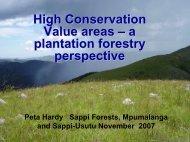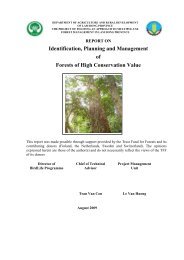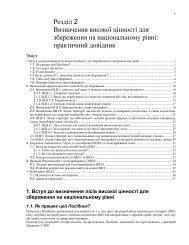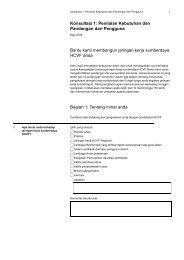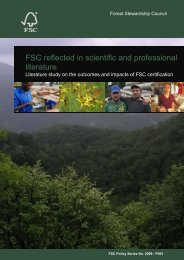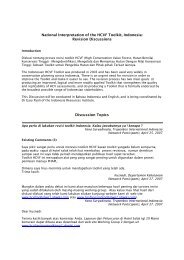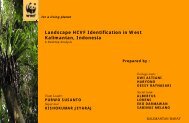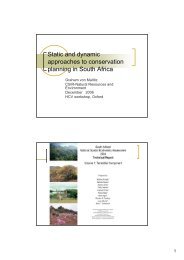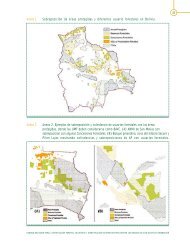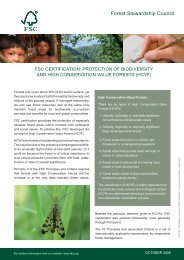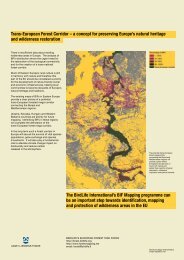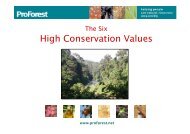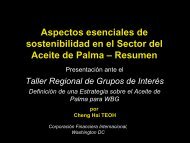Forests Sourcebook - HCV Resource Network
Forests Sourcebook - HCV Resource Network
Forests Sourcebook - HCV Resource Network
Create successful ePaper yourself
Turn your PDF publications into a flip-book with our unique Google optimized e-Paper software.
NOTE 5.3<br />
Strengthening Legal Frameworks in the Forest Sector<br />
The law is a powerful tool for shaping forest sector<br />
governance. Laws can create institutions and<br />
define institutional powers and responsibilities.<br />
Laws can set the bounds of acceptable behavior and set the<br />
punishment for crossing those bounds. Laws can change<br />
the allocation of money among government programs,<br />
and shift control over forest resources between central and<br />
local government and between government and other<br />
actors. Laws can define and strengthen property interests.<br />
Law can be part of the healing process that follows years of<br />
conflict (see box 5.12). In short, law plays a role in every<br />
forest governance issue (see chapter 5 for a definition of<br />
governance).<br />
The legal framework applicable to forests has at least two<br />
areas that the World Bank may help to strengthen. The first,<br />
and most obvious, is the law itself—usually statutes and regulations—and<br />
the instruments created to operate under the<br />
law, for example, contracts. The second is the technical<br />
capacity to work within the legal system. This includes the<br />
legal knowledge of forest officers and the forest-related<br />
knowledge of legislators, prosecutors, judges, and others<br />
who help shape and implement forest laws. It also includes<br />
the capacity of citizens to understand and work under the<br />
law. Making communities, enterprises, and civil society<br />
effective users of law and active participants in its development<br />
boosts the rule of law and amplifies the benefits of<br />
improving the laws.<br />
The usual focus of World Bank and donor legal framework<br />
projects is on the first of these areas, aiming to reform<br />
and strengthen the law. In the process, however, the projects<br />
also can strengthen capacity. For example, compiling an<br />
accurate set of the existing forest law is a first step toward<br />
writing new law, but the compilation process itself can also<br />
strengthen implementation of the present law. Public vetting<br />
of drafts of new laws is a way to improve the substance<br />
of reforms. It also gives officials hands-on training in dealing<br />
with the public, and gives stakeholders practical experience<br />
in policy making.<br />
Strengthening forest legal frameworks typically requires<br />
legal advisers, but the task calls for skills that go beyond<br />
knowledge of the law. Lawyers working in concert with<br />
foresters, economists, policy experts, government officials,<br />
and stakeholders can build frameworks that promote both<br />
sustainable development and the rule of law.<br />
OPERATIONAL ASPECTS<br />
The ultimate goal of designing legal frameworks is to<br />
ensure the creation of responsive structures that are<br />
capable of adapting to changing needs and conditions.<br />
Writing a law that works is no easy task, and the stakes<br />
are high. A really bad effort can leave the country with a<br />
law that looks impressive but is of little practical use and<br />
may promote cynicism about government and dampen<br />
commitment to the rule of law. A really good effort can<br />
set the stage for more effective forest administration.<br />
More important, it can improve the transparency of forest<br />
governance, motivate under-represented stakeholders<br />
to get involved in forest policy, and encourage respect for<br />
the law.<br />
Working with the law<br />
Writing forest laws. A good way to start is to consult two<br />
recent references on writing forest law. One, from the World<br />
Bank in collaboration with the Food and Agriculture Organization<br />
(FAO), is Forest Law and Sustainable Development:<br />
Addressing Contemporary Challenges Through Legal Reform<br />
(Christy, Di Leva, and Lindsay 2007). It is a comprehensive<br />
monograph on drafting forest law, with practical knowledge<br />
from experienced forest law drafters. Annex 5.3A to this<br />
note contains an outline of the monograph’s contents that<br />
173



